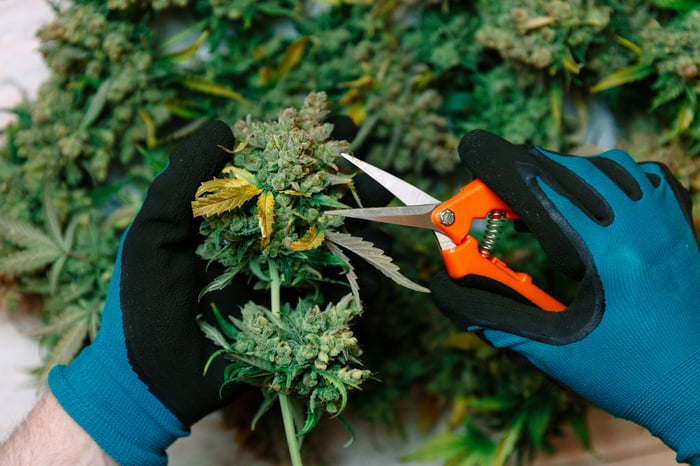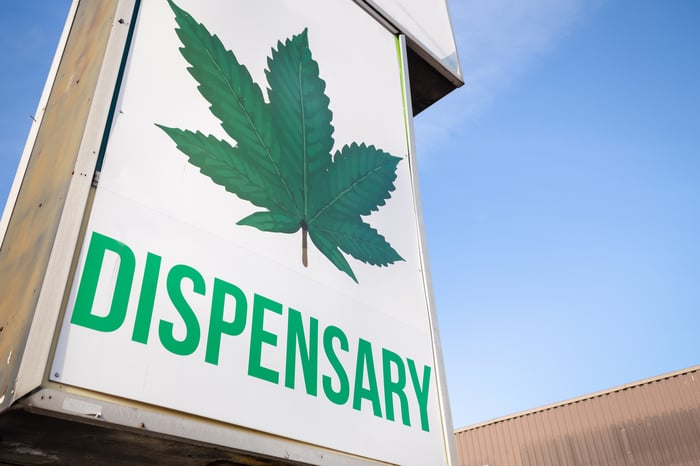Although high-growth tech stocks get most of the glory on Wall Street, it's often overlooked that the cannabis industry is growing just as quickly, if not faster, than some of the most-popular tech trends.
According to a recently released report from cannabis-focused analytics company BDSA, U.S. weed sales tallied $24 billion in 2021 and are expected to vault to $46 billion by 2026. That's a healthy compound annual growth rate (CAGR) of 14% over five years. Globally, pot sales are forecast to hit $61 billion by 2026, representing a slightly more robust 16% CAGR, and more than doubling the $29 billion in worldwide revenue reported last year.
With most marijuana stocks mired in a 13-month downtrend, these fast-growing stocks are now priced very attractively given the industry's outlook. Then again, we also know that not every company in a fast-growing trend will be a winner.

Image source: Getty Images.
Below are two marijuana stocks investors can confidently buy hand over fist, as well as one pot stock to avoid like the plague.
The first pot stock to buy hand over fist: Trulieve Cannabis
What better way to begin than by focusing on the most nominally profitable marijuana stock in North America, Trulieve Cannabis (TCNNF -5.95%).
Perhaps the biggest issue for U.S. multi-state operators (MSO) over the past year has been the lack of progress on Capitol Hill with regard to cannabis reform(s). The expectation had been that a Democrat-led Congress would quickly reform federal cannabis laws and clear a path for MSOs to thrive. However, other matters, such as COVID-19, have been more pressing. As a result, federal cannabis reform legislation has gone nowhere.
However, this shouldn't worry Trulieve's shareholders, or those of other U.S. MSOs. Nearly three-quarters of all states have legalized weed in some capacity, which is providing more than enough organic opportunity for MSOs to shine.
What's really allowed Trulieve Cannabis to stand out from its peers is the company's approach to expansion. While most MSOs were opening a handful of dispensaries and cultivation facilities in as many legalized markets as possible, Trulieve was laser-focused on medical marijuana-legal Florida. More than 110 of the companies approximately 160 operating dispensaries are located in the Sunshine State.
The allure of saturating the Florida market with dispensaries is twofold. First, the Sunshine State projects as one of the highest-dollar markets for pot sales by 2024. Second, saturating the state means not having to spend as much on marketing to build brand awareness. The end result is that Trulieve has gobbled up about half of Florida's dried cannabis flower and oils market share, and thanks to its low marketing expenses has reported recurring quarterly profits for more than three years.
Trulieve Cannabis also sent ripples throughout the pot industry when it completed the largest U.S. cannabis transaction in history last year. The acquisition of MSO Harvest Health & Recreation provides Trulieve a presence in the mid-Atlantic region of the country and, more importantly, gives it the leading share of the Arizona market, which Harvest Health called home. Arizona's residents voted to legalize adult-use weed in November 2020, with sales commencing two months later.
Trulieve can currently be scooped up for 20 times Wall Street's consensus earnings for 2022 despite the company being expected to sustain an annual double-digit growth rate until at least mid-decade.

Image source: Getty Images.
The second pot stock to buy hand over fist: Planet 13 Holdings
The second marijuana stock to buy hand over fist is small-cap MSO Planet 13 Holdings (PLNH.F -6.00%). Planet 13 is a company I'm so confident in that I added it to my personal portfolio early last week.
As I noted, most MSOs have approached expansion in the U.S. as a numbers game -- i.e., open as many dispensaries in as many high-dollar legalized states as possible. It's a fine strategy, but standing out can be difficult. Then there's Planet 13, which has easily become the most unique of all MSOs.
At the moment, Planet 13 has only two operating dispensaries; but they're unlike anything else in the country. The flagship Las Vegas SuperStore spans 112,000 square feet and houses an events center, café, and consumer-facing processing center. For some added context, the average Walmart is only 105,000 square feet in size. Meanwhile, the July 2021-opened Orange County SuperStore spans 55,000 square feet, 30% of which is devoted to selling space.
The key point is that Planet 13 is focused just as much on the experience of its customers as it is on making a sale. There's simply not another MSO in the country that can offer the selection and nostalgia that Planet 13 can bring to the table.
But that's not all. Having visited the Las Vegas SuperStore a few years back, I was impressed with its incorporation of technology (e.g., self-pay kiosks for repeat customers), the availability of personal budtenders to guide customers throughout the store, and the layout, which funneled consumers to higher-margin derivative products near the front of the store and by checkout counters.
Planet 13's next step is to move into new tourist-heavy markets. The company plans to open six smaller neighborhood-style stores in Florida, and somewhat recently received a license to open a store in Chicago, Ill. Assuming it can duplicate its success in Las Vegas in new markets, Planet 13 shouldn't have any trouble pushing to recurring profitability in 2022.

Image source: Getty Images.
The marijuana stock to avoid: Aurora Cannabis
On the other end of the spectrum is the one marijuana stock investors should avoid at all cost: Canadian licensed producer Aurora Cannabis (ACB -1.15%).
Back in 2018-2019, Aurora Cannabis was the talk of the town on the cannabis circuit. It eventually accrued 15 production facilities that, if fully developed, could have produced more than 600,000 kilos of cannabis on an annual basis. The company expected to become a domestic powerhouse and an exporting maven, with cost efficiencies that would drive its production costs way down.
But it's 2022, and none of the company's prognostications came to fruition.
Aurora has been somewhat hamstrung by regulators in its own country. Federal regulators were initially slow to approve cultivation and sales licenses. However, the bigger issue has been a combination of COVID-19 and slow retail license issuance in Ontario, the most-populous province. And without federal cannabis legalization in the U.S., Aurora has no chance of pushing into the far more lucrative U.S. market.
Another issue Canadian pot stocks have run into is that consumers have gravitated toward value brands. The push to sell premium dried flower and derivatives has fallen flat. As a result, the average sales price per gram for most Canadian licensed producers has been falling for years.
Then there are the self-inflicted wounds. Aurora Cannabis grossly overpaid for more than a dozen acquisitions and has written down billions of dollars in value in the wake of those deals. It's also shuttered five of its smaller facilities and halted construction at other facilities in an effort to lower its expenses and shrink its ongoing cash burn.
Furthermore, Aurora Cannabis has made a habit of drowning its shareholders with dilution. Because the company isn't profitable, it's used share issuances to fund deals and its ongoing operations. Between mid-2014 and Dec. 31, 2021, Aurora's outstanding share count ballooned from about 1.3 million (reverse split-adjusted) to 198.4 million. Shareholders have virtually no chance to make money when a company is diluting its investors this badly.





